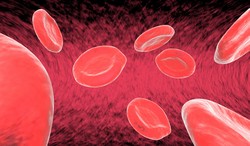A novel hepcidin antagonist as therapy against anaemia
Hepcidin is the key regulator of iron uptake and storage and, thus, availability for biological processes. Functional iron-deficient anaemia is characterised by elevated hepcidin blood levels causing iron accumulation in storage cells leading to limited iron availability for red blood cell production, or erythropoiesis. Hepcidin inhibition is predicted to increase iron availability and erythropoiesis, to normalise haemoglobin levels and to reverse anaemia. This EU-funded project EUROCALIN(opens in new window) (European consortium for Anticalins as next generation high-affinity protein therapeutics) involved ten EU partners who developed and tested the hepcidin binding Anticalin PRS-080 as a drug candidate for the treatment of functional iron-deficient anaemia. A manufacturing process was developed and PRS-080 protein was produced for nonclinical and clinical testing. PRS-080 has a strong binding affinity for hepcidin and inhibited the hepcidin induced down-regulation of the iron transporter ferroportin. In animals, PRS-080 administration induced the expected release of iron from iron storing cells, thus confirming its mode of action. In an anaemic disease model, inhibition of hepcidin and increased iron availability promoted haematopoiesis and reversed anaemia demonstrating animal proof of concept. The safety of PRS-080 was demonstrated in a 28-day toxicity study. A randomized and placebo controlled phase I clinical study was successfully conducted with PRS-080 in healthy subjects ClinicalTrials.gov Identifier NCT02340572(opens in new window). PRS-080 was well tolerated, only mild and moderate adverse effects were observed, independent of dose and treatment. PRS-080 circulated in the blood stream with a half-life of about 3 days. Blood hepcidin levels decreased shortly after PRS-080 administration and a dose dependent increase in serum iron and transferrin saturation was observed subsequently. This study demonstrated the excellent safety of PRS-080 as well as its intended biological activity on iron metabolism through the inhibition of hepcidin. This EU funded EUROCALIN project was successfully completed. Based on the promising results, PRS-080 is now being further evaluated in anaemic patients with chronic kidney disease.







